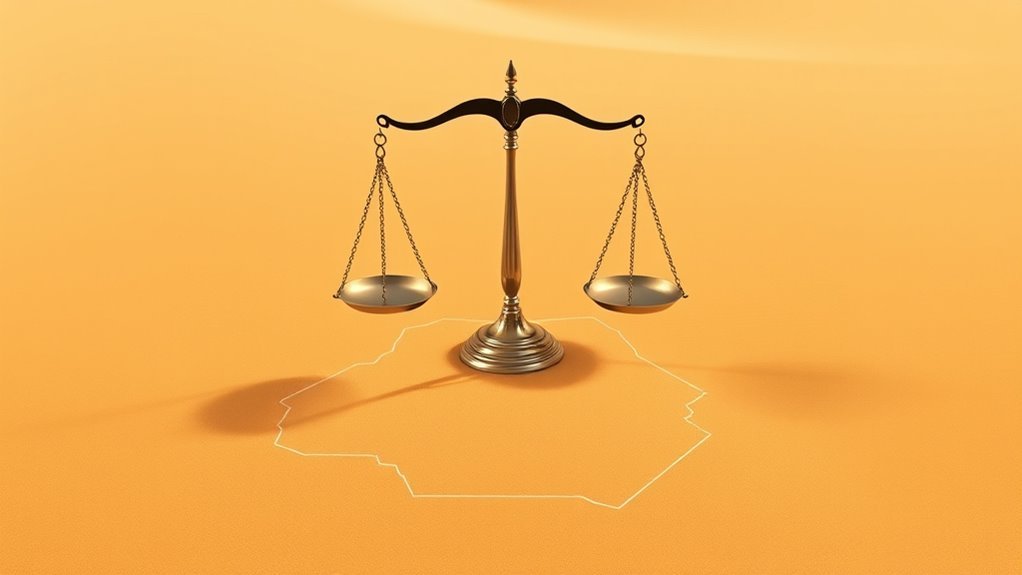Mauritania offers prospects in mining and fishing. Agriculture and renewable energy also present opportunities. Success requires navigating the legal landscape. Expertise is needed for infrastructure and investment codes. Funding options include local banks and microfinance. Foreign investment needs a robust business plan. Sustainability with local engagement is essential. Financial reporting inspires confidence. Industry events build networks. Investigate further to understand Mauritania’s potential.
Main Points
- Explore investment opportunities in mining (iron ore, gold), fishing (sustainable practices), agriculture (date palm, livestock), and renewable energy (solar, wind).
- Navigate legal and regulatory requirements by engaging legal expertise, understanding investment codes, and conducting land ownership due diligence.
- Secure funding through savings, local bank loans, microfinance, government programs, and attract foreign investment with a strong business plan.
- Improve financial reliability by networking with investors, attending industry events, and creating well-structured business plans using financial reporting.
- Prioritize sustainable business practices through environmental responsibility, resource management, community engagement, and workforce training for long-term success.
Key Sectors for Investment
Mauritania’s key sectors for investment include mining, fishing, and agriculture. Iron ore and gold represent significant opportunities. Artisanal fishing provides employment, but sustainable practices are needed. Agriculture, particularly date palm cultivation and livestock raising, holds further possibilities, though it is vulnerable to climate change.
New investments are being encouraged in renewable energy, especially solar and wind, to address energy needs and diversify the economy.
Relatedly, infrastructure projects, such as roads and ports, are crucial to support the growth of all sectors. Investors should conduct thorough due diligence and consult with local experts.
Navigating the Legal and Regulatory Landscape

The development of infrastructure and renewable energy, along with growth in established sectors, requires careful consideration of the nation’s legal and regulatory environment. Bureaucracy can be challenging, thus engaging local legal expertise is crucial.
Understanding investment codes, labor laws, and tax regulations will streamline business operations. Land ownership and acquisition processes demand due diligence.
Navigating permits and licenses necessitates patience and adherence to established procedures. Transparency initiatives are underway, yet informal practices can still influence outcomes. Compliance minimizes risks and builds trust with stakeholders. Businesses that prioritize ethical conduct are more likely to thrive.
Securing Funding and Investment
For ventures in Mauritania, securing funding and investment is vital for growth. Initial capital can be sourced through personal savings, loans from local banks, or support from family and friends.
Microfinance institutions offer smaller loans, often targeting entrepreneurs and small businesses.
Exploring government programs and initiatives designed to support specific sectors can unlock opportunities.
Attracting foreign investment requires a well-structured business plan and demonstrating potential for returns. Networking with investors, attending industry events, and seeking guidance from investment promotion agencies are crucial steps.
Diligence in financial reporting is also key to securing faith in investors.
Building a Sustainable Business
Sustaining operations in Mauritania necessitates integrating long-term strategies. Businesses should prioritize environmental responsibility, incorporating sustainable practices to minimize their ecological footprint. This includes efficient resource management, waste reduction, and exploring renewable energy options.
Social responsibility is equally crucial. Companies must engage with local communities, fostering positive relationships through job creation, skills development, and support for local initiatives.
Transparency and ethical conduct will cultivate trust and a positive reputation. A focus on innovation and adaptability will enable businesses to navigate challenges and capitalize on emerging opportunities. Building a skilled workforce through training programs is also vital.
Common Questions
What’s the Best Time of Year to Visit Mauritania?
The best time to visit Mauritania is during the cooler, drier months. November to February offers more comfortable temperatures. The oppressive heat subsides. Sandstorms are less frequent during this period for travelers.
Is It Safe for Foreigners to Travel in Mauritania?
Mauritania poses safety risks for foreign travelers. Threats include terrorism, banditry, and kidnapping, particularly in border regions. Travelers should exercise extreme caution, avoid isolated areas, and stay informed about current security advisories from their respective governments for guidance.
What Are Typical Living Expenses in Mauritania?
Typical living expenses in Mauritania vary widely. Costs depend on lifestyle and location. Urban areas like Nouakchott are generally more expensive. Rent, food, and transportation contribute significantly to monthly budgets. Utilities and personal spending also factor into expenses.
Do I Need to Learn French or Arabic?
French and Arabic are beneficial in Mauritania. Arabic is the official language, important for daily life. French is often used in business and government. Learning both enhances opportunities but isn’t always strictly required, depending on employment.
How Do I Find Reliable Local Partners?
Finding reliable local partners involves networking at industry events. One should research potential partners meticulously, verifying credentials and seeking references. Engaging local chambers of commerce and trade organizations can offer valuable connections and insights into reputable businesses.